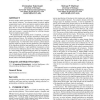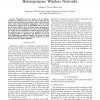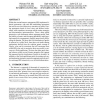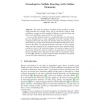115
click to vote
BROADNETS
2005
IEEE
15 years 3 months ago
2005
IEEE
— We present a game-theoretical model of a wireless communication system with multiple competing users sharing a multiaccess fading channel. With a specified capture rule and a ...
ATAL
2008
Springer
15 years 3 months ago
2008
Springer
In many complex multi-agent domains it is impractical to compute exact analytic solutions. An alternate means of analysis applies computational tools to derive and analyze empiric...
107
click to vote
INFOCOM
1995
IEEE
15 years 4 months ago
1995
IEEE
— We consider a multiuser network that is shared by noncooperative users. Each user sets up virtual paths that optimize its own selfish performance measure. This measure account...
GECCO
2006
Springer
15 years 4 months ago
2006
Springer
Coevolutionary algorithms search for test cases as part of the search process. The resulting adaptive evaluation function takes away the need to define a fixed evaluation function...
123
click to vote
ATAL
2006
Springer
15 years 4 months ago
2006
Springer
In many Multi-Agent Systems (MAS), agents (even if selfinterested) need to cooperate in order to maximize their own utilities. Most of the multi-agent learning algorithms focus on...
ATAL
2006
Springer
15 years 4 months ago
2006
Springer
We present a technique for reducing a normal-form (aka. (bi)matrix) game, O, to a smaller normal-form game, R, for the purpose of computing a Nash equilibrium. This is done by com...
125
click to vote
ATAL
2006
Springer
15 years 4 months ago
2006
Springer
Learning to converge to an efficient, i.e., Pareto-optimal Nash equilibrium of the repeated game is an open problem in multiagent learning. Our goal is to facilitate the learning ...
108
Voted
ICC
2007
IEEE
15 years 4 months ago
2007
IEEE
Prefetching has been shown to be an effective technique for reducing resource cost and delay in heterogeneous wireless networks. However, in modern wireless local area networks, th...
CONEXT
2007
ACM
15 years 5 months ago
2007
ACM
Within the current Internet, autonomous ISPs implement bilateral agreements, with each ISP establishing agreements that suit its own local objective to maximize its profit. Peerin...
128
click to vote
CAAN
2007
Springer
15 years 5 months ago
2007
Springer
We study the efficiency of selfish routing problems in which traffic demands are revealed online. We go beyond the common Nash equilibrium concept in which possibly all players rer...




